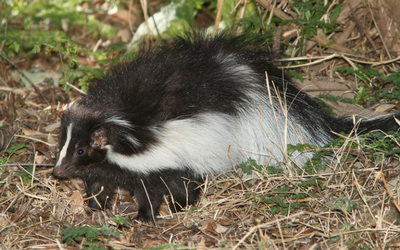
Spring has sprung, and the critters that have been sleepily overwintering have begun the grand venture out from their winter retreats. This time of year can be intriguing for pets. New sights, sounds, and smells! Skunks can be an unwelcome nuisance though, as mating season gets under way. Skunks mate mid-winter to early spring, so their young are born between April and June. This is when people notice new little residents on their property!
Skunks are generally shy, and not aggressive unless they feel threatened. They are nocturnal, usually coming out of their dens around dusk to begin the search for food. Skunks are burrowers, and like forested, brushy areas and fields. However, in urban areas they often seek out dark and quiet spaces, like under sheds and decks, to build their dens.
Your dog getting sprayed by a skunk is right up there as one of the most groan-worthy situations to deal with! Because skunk spray is oil-based, it transfers easily and is extremely hard to get rid of. When it comes to skunks, keeping your pets from getting sprayed is much easier than dealing with the alternative.
The best way to keep your dog from getting sprayed is to discourage skunks from setting up residence on your property. Below are some measures you can take to make your property less attractive to skunks:
- Make sure your property has a secure fence that extends at least a foot underground so it can’t be dug under.
- Block access to areas under sheds and decks that might be of interest to skunks and other critters that burrow.
- Keep doors and windows in garages and other outbuildings securely shut to prevent nosy critters from exploring.
- Remove any piles of old logs, brush, or yard debris that may make an appealing spot for a skunk den. Keeping your yard well-maintained and mowed will reduce the number of spots skunks could hide or den in.
- Keep garbage cans closed and secure. Skunks will eat almost anything, so reduce the temptation.
- Treat your yard with a non-toxic grub repellent. Skunks will dig for grubs to eat, so eliminating them will discourage skunks.
- If you have fruit trees, pick up the fallen fruit. Rotting fruit will attract skunks.
- Install motion-activated patio or porch lights. They can help make your property less appealing for skunks to visit at night.
If your dog does get sprayed, there are many treatments to choose from, from home remedies to commercial products, that vary in degree of effectiveness. Speak with your veterinarian about the options. Chances are the solutions your veterinarian may recommend, or have available in their clinic, will work much better than those you find online. For more information and a veterinary-approved home remedy that may help you in a pinch, see the article “Skunk Spray and Your Dog”, found in the Pet Health Article section here on your veterinarian’s website.
What’s the bottom line – or rhyme?! – in all of this?
The best way to deal with the spray is to keep the skunks at bay!